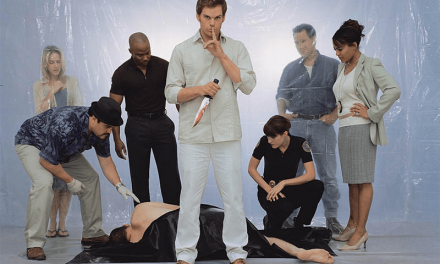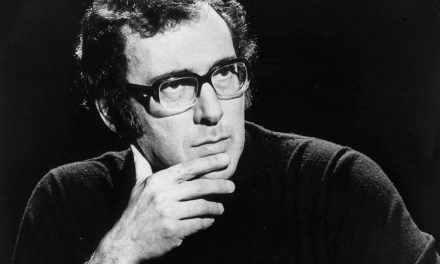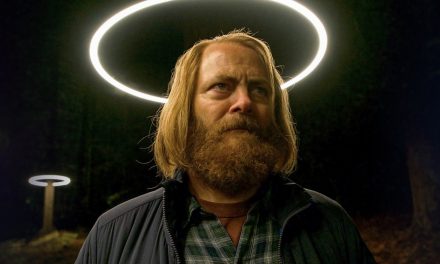“A room without books is like a body without a soul,” remarked the first century AD Roman philosopher Cicero. Well, apparently anyway. He was anti-embezzlement – a good thing – and I’m sure he loved his books too. Even if he didn’t manage to get any TV tie-in paperbacks, having only narrowly missed out on being around for the Penguin edition of The Quatermass Experiment (1959).
Of late, my wife and I have become quite fascinated by TV tie-ins. It started off as something part-research project, part-database exercise, and part-last ditch attempt to avoid finding oneself featuring on Channel 4’s The Hoarder Next Door (2012-2014) should it ever be recommissioned. What it’s turned into now, we’re not quite sure… but – like writing this blog – it’s kinda fun, passes the time, and throws up some occasionally bonkers stuff which makes us both go ‘Gosh – that’s interesting’.
I’m pretty sure that my ‘first time’ tie-in was The Tomorrow People in The Visitor by Roger Price and Julian Gregory which I purchased with 25p of my pocket money while on holiday in Wells-next-the-Sea [i] on the lovely summer’s afternoon of 12 July 1973. The first run of Thames’ teen telefantasy (1973-1979) was then still on air, but I knew that the book would help sate my thirst for these enjoyable adventures once it left the Monday ITV afternoon schedule.
Since then, the collection has increased in ways that have necessitated the construction of an extra room on our house. American and British editions of assignments for The Man from UNCLE (1964-1968) sit between script books from The Phil Silvers Show (1955-1959) and the three volumes bearing the tales of the Warship (1973-1977) HMS Hero. Above and below can be found everyone from George Bulman to Blamire, Compo and Clegg.
These fictional items range from the scripts themselves through prose novelisations (so vital as a record of a series in the pre-video days) into the expanded universes of adventures taking place in the gaps between the weekly broadcasts. Some are brilliant. Lee Goldberg’s volumes about OCD PI Monk (2002-2009) are a superb example of prose perfectly presenting the series’ style. Victorian London closes in around you as you delve into Arthur Swinson’s casebooks concerning Sergeant Cork (1963-1968). Others are rewardingly experimental, such as when Thomas M Disch returned Number 6 to the Village as The Prisoner (1967-1968), or when Andrew Davies recounts how it was Ron Rust who really wrote A Very Peculiar Practice (1986-1988) for the BBC. Ian Kennedy Martin and Terry Nation both give glimpses of how The Sweeney (1975-1978) and Survivors (1975-1977) would have felt had they not left their creations after differences with producers. But occasionally, you do wonder if some of the authors had ever actually seen an episode of the shows they were writing about, or were simply fusing their own imaginations with a press release and two photos of the lead performer.
Other examples are more off-beat. We have scripts from The Troubleshooters (1966-1972) and Doomwatch (1970-1972) repurposed as educational tools for English classes courtesy of Longman. We have seen Love Over Gold (1993), the novel chronicling the romance of the couple in the Nescafe Gold Blend commercials. We have yet to experience either of the two Strictly Come Dancing (2004-) novels – the first of which. Shimmer (2010) follows the life of a production runner on the series. Nor have we yet read The Cartwright Murder (2000), a century-old tale of Coronation Street (1960-) chronicled by none other than Ken Barlow…
My recent rumination on these occasionally bizarre books, in conjunction with coincidental correspondence, reminds me that the world of academia, fandom and TV tie-ins are bound together by Dr Una McCormack, a Cambridge-based academic in the creative writing field who has managed a simultaneous career as a New York Times best-selling author.
Before becoming an academic and an author, Una was a fan-fiction writer. I remember how we attended a convention in 1991 and spoke to Terrance Dicks, a television scriptwriter turned mainstay of the Doctor Who novelisation range who was signing his original novel Exodus (1991). Having grown up relishing his volumes, we were delighted to tell him how much we enjoyed the Monty Python gag in his new work, and he was delighted to tell us how glad he was that somebody had actually noticed it.
Terrance died in August 2019 – his final published work was the short story Save Yourself in the BBC Books anthology Doctor Who: The Target Storybook (2019). Also in this tome is Grounded … written by none other than Una. She recently reminded me how her first professionally published piece had been A Time & A Place in Issue 197 of Doctor Who Magazine (17 March 1993), and how that was the start of a career that’s taken in official Doctor Who novels from BBC Books, tales from the 57 varieties of the Star Trek (1966-whenever) universe, and also other works of what I’ll refer to here as ‘original fiction’. Yes, apparently there are books published that aren’t about television shows…
But with TV tie-ins, you know that with Una, you’re in safe hands. She’ll put her own literary creative spin on it – yet it’s recognisable as the show you see on your screens. Because she is still very much in touch with why she began doing these things in the first place, the start of her journey along a rich mix of fandom, academia and TV tie-ins – experiencing and creating more of the things that she cares about and which inspired her in the first place.
And if she wasn’t a pair of safe hands, Pocket Books would never have trusted her to have written The Last Best Hope (2020), the lead-in novel to the new web series Star Trek: Picard (2020-). And on 27 February at London’s Forbidden Planet, it’ll be Una signing the books to inspire the next generation (no pun intended) of small screen scribes.
From fanfiction to brilliant big brandings via academia. To quote again from Cicero [ii]: “I love it when a plan comes together.”
____________________________________________________________________
Andrew Pixley is a retired data developer. For the last 30 years he’s written about almost anything to do with television if people will pay him – and occasionally when they won’t. Look, while you’re reading… anyone got spare copies of the three Naked City tie-ins published by Consul in 1964 at all? All by Steven Frances: The Day the Island Almost Sank, The Fault in Our Stars and Panic in the City. Let me know, quote a reasonable price, and I’ll get back to you…
Footnotes:
[i] Where they still do the best fish and chips I’ve ever tasted at French’s.
[ii] Pretty sure it’s Cicero. Have to admit I didn’t actually check. But it sounds like him.









In haste…
Michael Herbert asked me to promote the following:
Visions of the Future with Una McCormack, Saturday 7th March 2020
[url]cstonline.net//cstonline.net//maryquaileclub.wordpress.com/2020/01/27/next-mary-quaile-club-event-visions-of-the-future-with-una-mccormack-saturday-7th-march/[/url]